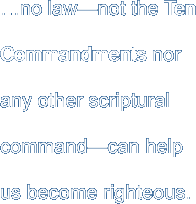
HOME / PROCLAMATION! MAGAZINE / 2013 / WINTER / ARE YOU FORMED BY DISCIPLINES?

RICK BARKER
Seventh-day Adventists and Evangelical Christians have different vocabularies and, at times, different definitions of the same words. These differences create confusion during discussions between these groups and contribute to the barriers former Adventists face when transitioning into new churches. For example, the word “Law” in many evangelical circles refers to the whole counsel of God including any command of God given throughout the 66 books of Scripture. In general, the word “Law” does not specifically refer to the Ten Commandments or to the Mosaic Law. Therefore, when we are told in the New Testament not to gossip, for example, this command is “Law” from this evangelical perspective.
Related to this definition of “Law” is a concept many evangelicals refer to as “the third use of the Law”. This idea suggests that the Law, whether it is the Mosaic Law or the Law of Christ, has an ongoing function in the life of believers as a guide or source of instruction that directs a believer toward living a more godly, righteous life. Thus, according to this idea, the third use of the Law is not for justification but is rather for the sanctification of believers.
The Book of Galatians, however, argues against a sanctifying use of the Law for believers. To be sure, Christians from diverse backgrounds are quick to affirm that the Law does not save us, as Paul describes in Galatians 2:16:
…a man is not justified by the works of the Law but through faith in Christ Jesus, even we have believed in Christ Jesus, so that we may be justified by faith in Christ and not by the works of the Law; since by the works of the Law no flesh will be justified.
Despite this agreement regarding the Law and justification, however, questions arise about the ongoing role of Law for those who have been justified.
The Law in Galatians
It is important to understand what “Law” is being discussed in Galatians. It is a popular misconception to conclude that the “Law” being pushed upon the Galatians was the collection of rabbinical Jewish (or Talmudic) laws that were added above and beyond the Law given in Scripture. The consistent use and meaning of “Law” throughout the book of Galatians, however, argues against this notion. Galatians 4:21-25 makes clear that the Law being discussed is the Law given at Sinai:
Tell me, you who want to be under law, do you not listen to the law? For it is written that Abraham had two sons, one by the bondwoman and one by the free woman. But the son by the bondwoman was born according to the flesh, and the son by the free woman through the promise. This is allegorically speaking, for these women are two covenants: one proceeding from Mount Sinai bearing children who are to be slaves; she is Hagar. Now this Hagar is Mount Sinai in Arabia and corresponds to the present Jerusalem, for she is in slavery with her children.
The Law that comes from Mount Sinai is the Law given by God, including—and particularly—the 10 Commandments. The 10 Commandments, moreover, are specifically identified as the covenant given to Israel (at Sinai) in Deuteronomy 5. In other words, Paul’s reference to the covenant “proceeding from Mount Sinai” is a direct reference to the 10 Commandments, the actual words of the Mosaic covenant. Galatians 3:17 states that the Law in question came 430 years after the promise to Abraham. Again, this is the Law that God gave through Moses including the 10 Commandments. Furthermore, it would make no sense that Rabbinical laws—laws not given in Scripture—would be the laws that would lead one to Christ (Gal. 3:24) or shut one under sin (Gal. 3:22). The contextual basis is abundantly clear: the Law being discussed in Galatians is the Law of God given at Sinai, which includes the 10 Commandments.
When we have been made alive in Jesus, the Law given on Sinai no longer has any authority over us. We have been brought into the kingdom of God’s beloved Son (Col 1:13), and the Law of Christ now constrains us (Gal. 6:2). Now the Holy Spirit, the Author of Scripture, applies the entire Word of God—the Law of God—to our lives, convicting us of sin and righteousness and judgment (Jn. 16:8-9). In fact, the written instructions and rebukes from the apostles show that God’s Word has an ongoing role in instructing Christians. Because a battle between our flesh and the Spirit continues to wage in us in this life (Rom. 7:14-25), we are prone to deception when we try to justify our fleshly longings by attempting to convince ourselves that they are promptings from God. God’s Word, however, shows us our sin plainly.
Purpose of the Law
We have established that the Law being discussed within the book of Galatians is a God-given Law. This Law of God is described as perfect (Ps. 19:7), good, and holy (Rom. 7:12). Yet the perfect Law could never make anyone perfect (Heb. 7:18-19) because righteousness can never come through a Law. Righteousness can only come to us through a promise to those who believe (Gal. 3:21-22). In fact, this inability of the Law to make us righteous is true not only of the 10 Commandments and other laws given at Sinai; it is true of any Law given by God, even the Law of Christ (Gal. 6:2). Paul describes the righteousness we receive by saying it is “not derived from the Law” but is “through faith in Christ, the righteousness which comes from God on the basis of faith” (Phil. 3:9). He further explained this fact when, in Romans 3:21-22, he said, “But now apart from the Law the righteousness of God has been manifested, being witnessed by the Law and the Prophets, even the righteousness of God through faith in Jesus Christ for all those who believe.”
In other words, no Law—not the Ten Commandments nor any other Scriptural command—can help us become righteous. Only God can make us righteous when we trust in the Lord Jesus, and this righteousness is His.
Ultimately, if we look to the Law for instruction, it can only provide the proof that we fall short continually and are in need of a Savior (Rom 3:19-26). This reality is the same conclusion Paul articulates in Galatians 3 when he states that the Law is a schoolmaster (a source of instruction and supervision) to lead us to Christ. Once we come to Christ, we are no longer under this instruction; v. 25, “Now that faith has come, we are no longer under the supervision of the law.”
Sanctification and Law
“OK,” you may agree; “I see that the Law does not play a part in our justification. But what about sanctification?” Galatians 3:1-3 directly addresses this question:
You foolish Galatians, who has bewitched you, before whose eyes Jesus Christ was publicly portrayed as crucified? This is the only thing I want to find out from you: did you receive the Spirit by the works of the Law, or by hearing with faith? Are you so foolish? Having begun by the Spirit, are you now being perfected by the flesh?
Throughout Galatians, Spirit and faith are contrasted with flesh and Law. In fact, the phrase “being perfected” would be a very good synonym for the concept of sanctification. So Paul asks the Galatians, and by extension each of us, “having been justified by faith through the actions of the Spirit, are we foolish enough to believe that we will be sanctified by the works of the Law in the flesh?” Clearly the intended answer is “no”. Our life with God, from start to finish, is by the action of His Spirit, not by our actions.
One evangelical seminary professor describes God’s role in our sanctification this way: “Sanctification means that the Spirit permeates everything the Christian thinks, says and does. The Christian’s personal holiness is as much a monergistic [see sidebar] activity of the Holy Spirit as is his justification and conversion. The Spirit who alone creates faith is no less active after conversion than He was before.”
Galatians 3:1-3, however, is not the only place in this chapter where Paul makes this point. We saw earlier that righteousness cannot come through any Law: “For if a law had been given which was able to impart life, then righteousness would indeed have been based on law” (v. 21). This fact—that no law can contribute to our righteousness—applies to sanctification just as much as it applies to justification. The Law—not just the Mosaic law but every command from God—is very good at accomplishing the role of pointing out sin, but it was never made to increase a person’s righteousness. Our attempts to observe the Law do not sanctify us. On the contrary, our attempts to focus on the Law arouse our sinful passions (Rom. 7:5) and ultimately increase our sin (Rom 7:7-11).
The Work of the Spirit
Paul goes on to give a detailed contrast of how ongoing life in the Spirit operates differently from instruction by the Law. Galatians 5:13-23 says:
For you were called to freedom, brethren; only do not turn your freedom into an opportunity for the flesh, but through love serve one another. For the whole Law is fulfilled in one word, in the statement, “YOU SHALL LOVE YOUR NEIGHBOR AS YOURSELF.” But if you bite and devour one another, take care that you are not consumed by one another. But I say, walk by the Spirit, and you will not carry out the desire of the flesh. For the flesh sets its desire against the Spirit, and the Spirit against the flesh; for these are in opposition to one another, so that you may not do the things that you please. But if you are led by the Spirit, you are not under the Law.
Now the deeds of the flesh are evident, which are: immorality, impurity, sensuality, idolatry, sorcery, enmities, strife, jealousy, outbursts of anger, disputes, dissensions, factions, envying, drunkenness, carousing, and things like these, of which I forewarn you, just as I have forewarned you, that those who practice such things will not inherit the kingdom of God.
But the fruit of the Spirit is love, joy, peace, patience, kindness, goodness, faithfulness, gentleness, self-control; against such things there is no law.
There is a great deal in this short passage, particularly when we realize the immediate context of a discussion about not being placed in subjection to the Law of God given at Sinai. In proclaiming a believer’s freedom from the Law of God, Paul gives no ground to those who would take this as a “get out of jail free card” and let sin reign in their lives. Nevertheless, Christ’s death provides full pardon and freedom from the Law. How can we understand this apparent paradox?
Two things occur when we are born again. First, we die to our old self, and we also join in His resurrection through the new birth (Rom. 5:10; 6:4-5). We become God’s children, and His Spirit dwells within us (Rom. 8:16-17; Eph. 1:13-14). The result of His Spirit dwelling in us is that He produces fruit. Furthermore, there are no Laws—neither the Law given at Sinai nor the commandments of Christ—against this fruit. Significantly, Paul is contrasting this fruit of the Spirit with the deeds of our flesh. If there were any chance that we might be confused about our behavior, that we might wonder whether God’s Spirit or our flesh was leading us to an action, the descriptions in these verses make very clear which actions are from the Spirit and which are from the flesh.
This short description by Paul in Galatians is very similar to the longer description of flesh, Law, and Spirit found in Romans 7 and 8.
Interestingly, this passage also helps to explain how we can be both free from the Law through grace and yet establish the Law (Rom 3:31). First, if we look to the Law as a guideline for righteous behavior, we’ll always be failures, because the Law’s purpose was to show us our sin and failures (Rom 3:19-20). Therefore, if we perform deeds of the Law in order to achieve righteousness or to enhance sanctification, we will be forced to do one of two things; either we will have to admit complete failure—because the Law always convicts us of sin and never helps us achieve holiness—or we will try to rationalize the full demands of the Law and reinterpret it into something that we think we can actually keep. If, however, we allow all of Scripture to inform us of our sin as the Holy Spirit teaches us, we establish the Law as God’s Word to us.
The Law, however, does not allow for reinterpretation and for lessening its demands so we can deceive ourselves into thinking we can keep it. When a person lessens the demands of the Law, he undermines both the Law itself and the holiness of God who established both its mandates and its punishments. Moreover, lessening the Law minimizes the value of Christ’s death! When one has been truly freed from the demands of the Law by a full and complete pardon, he no longer has a fear of that Law because he is no longer under its authority. He can see his own shortcomings reflected back from the Law and not require any softening of its demands, because he knows that all of the demands of the Law have already been met in the life, death, and resurrection of Jesus and freely credited to him.
In other words, I am not afraid to admit that I am a sinner when I truly know that God has already forgiven all my sin. I am free from the Law.
The Law does not give us the desire to do what is good and loving; it is only able to show us that we are not being completely good and loving. The Spirit Who indwells us applies God’s written Word to our lives, convicts us regarding God’s will for us, places the desire for that will within us, and ultimately does the good work through us (Phil. 2:13).
Recapitulation
In conclusion, we can summarize how we receive sanctification in the following way:
- We are under the Law of Christ, not the Mosaic Law or the Ten Commandments.
- We do not obtain justification through following any Law—neither the Law of Christ nor the Mosaic Law.
- We do not obtain sanctification through following any Law—neither the Law of Christ nor the Mosaic Law.
- The nature of any Law is that it can only point out sin, not change the sinner.
- The Law of Christ in the written Word of God, however, is still active in pointing out sin for believers.
- Sanctification is the work of the Spirit in us, not of our own work, nor do we accomplish sanctification while tapping into the power of the Spirit.
Our righteousness comes from God’s work, not our own. It is the result of faith from beginning to end, as expressed in Rom 1:17a: “For in the gospel a righteousness from God is revealed, a righteousness that is by faith from first to last.” †

Copyright 2014 Life Assurance Ministries, Inc., Camp Verde, Arizona, USA. All rights reserved. Revised April 28, 2014. Contact email: proclamation@gmail.com
Rick Barker is a native of Southwestern Ohio and facilitates a weekly Bible study for former and transitioning Adventists in the Dayton, Ohio, area. Rick graduated from Andrews University in 1987 and received a Masters degree from the University of Dayton. Rick and his wife Sheryl formally left the Adventist chuch in 2004. Prior to this they had been active in the Miamisburg and Wilmington, Ohio, churches. |
||
W I N T E R • 2 0 1 3
VOLUME 14, ISSUE 4



